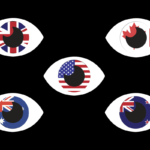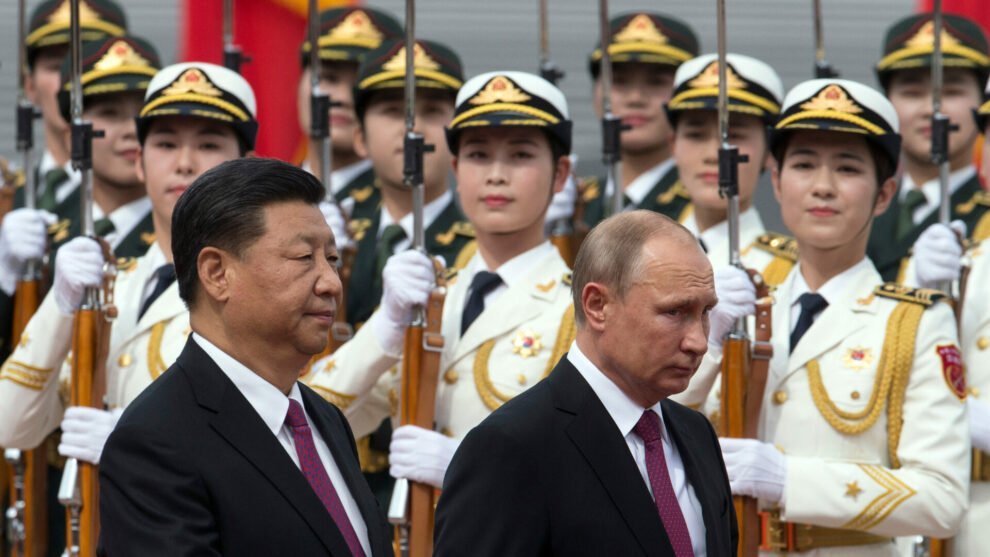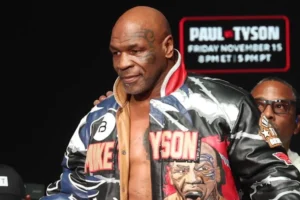Secretary of State Antony J. Blinken says Washington has indications that Beijing is strongly considering giving military aid to Moscow for the war in Ukraine.
MADRID — When the top foreign policy officials from the United States and China appeared this weekend at Europe’s premier global security conference, both stressed that their governments were not seeking a new Cold War.
Yet, new warnings by U.S. officials that China may be preparing to give weapons and ammunition to Russia for its war on Ukraine portend the worst of the old Cold War.
In that decades-long shadow struggle, the United States, the Soviet Union and occasionally China poured military resources into protracted wars around the globe, engaging in bloody proxy conflicts from Korea to Vietnam to Afghanistan.
American officials say that China, unlike Iran and North Korea, has over the year of the war in Ukraine refrained from giving material aid to Russia. President Biden has stressed to Xi Jinping, China’s leader, that any such move would have far-reaching consequences.
There is no doubt that China’s entry into the war in that manner would transform the nature of the conflict, turning it into an epochal struggle involving all three of the world’s largest superpowers and their partners on opposing sides: Russia, China, Iran and North Korea aligned against the United States, Ukraine and their European and Asian allies and partners, including Japan and South Korea.
Warnings to China from Antony J. Blinken, the U.S. secretary of state — made in multiple settings on Saturday and Sunday, including on television — revealed that the Biden administration believes Beijing is close to crossing the line. And the fact Mr. Blinken spoke out publicly shows the desperation of the United States as it tries to dissuade Mr. Xi and his aides from doing so.
Officials in Washington and European capitals, including here in Madrid, one of the staunchest aid providers to Kyiv, say that they are bracing for a new Russian offensive in Ukraine this spring, and that they need to do everything they can this winter to blunt Russia’s chances of breaking through Ukrainian defenses.
Mr. Blinken confronted China’s top foreign policy official, Wang Yi, when the two met on Saturday night on the sidelines of the Munich Security Conference, telling him Washington believed that China was “considering providing lethal support to Russia in its efforts in Ukraine,” the secretary of state said in an interview with Margaret Brennan of CBS News.

“And I was able to share with him, as President Biden had shared with President Xi, the serious consequences that would have for our relationship,” Mr. Blinken said.
Mr. Blinken said the aid would consist of weapons and ammunition, but he did not give details on the underlying intelligence that the Biden administration presumably has acquired.
The State of the War
- Portending a Global Rift: Secretary of State Antony J. Blinken said that China is strongly considering giving military aid to Russia, a move that would transform the war into a struggle involving three superpowers.
- Western Support: Nearly one year into the war, American and European leaders pledged to remain steadfast in their support for Ukraine amid worries about how long their resolve will last.
- Harris’s Comments: Vice President Kamala Harris declared that the United States had formally concluded that Russia had committed “crimes against humanity” in its invasion of Ukraine.
- A Russian Mole in Germany?: A director at Germany’s spy service was arrested on suspicion of passing intelligence to Russia. German officials and allies worry just how deep the problem goes.
Right before Russia invaded Ukraine last February, Moscow and Beijing unveiled a 5,000-word statement declaring a “no limits” partnership, stirring anxiety in Washington and in European capitals.
The United States has tried to discourage China from giving Russia military aid in part by releasing intelligence findings, which has increased global public scrutiny of any potential Chinese actions to support the Russians. In March 2022, U.S. officials told reporters from a few news organizations, including The New York Times, that Russia had asked China for aid. That disclosure took place right before Jake Sullivan, the White House national security adviser, was to meet Yang Jiechi, China’s top foreign policy official at the time, in Rome.
It was part of a wider strategic gambit involving use of intelligence by Washington to try to foil Russia’s war. In the months before President Vladimir V. Putin began his invasion, the Biden administration quickly made public declassified intelligence to try to deter him from sending in his troops.
That did not work. The intelligence proved accurate — but Mr. Putin went ahead with his war.
The public comments by Mr. Blinken over the weekend, and private remarks by U.S. officials to reporters, were another chapter in that same strategy of intelligence disclosure by the Americans. Vice President Kamala Harris also warned China against supporting Russia in a speech to the Munich conference on Saturday, and U.S. officials said they have shared intelligence with allies.
American officials say China has deepened its ties with Russia during the war. And last Thursday, on the eve of the security conference, Wang Wenbin, a spokesman for the Chinese Foreign Ministry, said, “China stands ready to work with Russia to further advance our comprehensive strategic partnership of coordination for a new era.”
Wang Yi, the top foreign policy official, arrived in Moscow on Monday at the end of a diplomatic tour of Europe, a trip that American officials are closely watching. Russian officials have said Mr. Xi will visit their country sometime this year. The same day, Mr. Biden made a surprise visit to Kyiv and strolled in the historic city center with President Volodymyr Zelensky as air raid sirens blared.
Mr. Zelensky told a German newspaper on Monday that China giving weapons to Russia would result in a “world war,” and that he hoped Chinese leaders would refrain from doing so after making a “practical assessment.”

China has given Russia diplomatic support throughout the war, and its Foreign Ministry has officially pushed anti-American and anti-Ukrainian conspiracy theories that appear to have originated with Moscow and its allies and partners.
In January, the United States imposed sanctions on a Chinese company for giving satellite imagery to the Wagner Group, the Kremlin-aligned Russian militia that is fighting in Ukraine and is active in Africa and the Middle East. It has also penalized a few other Chinese companies for violating export controls against Russia, U.S. officials said.
The Russian military is still able to get Chinese-made commercial drones to use in the war, The Wall Street Journal has reported.
The United States has few, if any, good cards to play with China. Though the two nations remain robust trade partners, relations are at one of their lowest points in decades, made worse by the crisis that erupted over the Chinese spy balloon that entered the continental United States at the start of this month.
Source: The New York Times
















